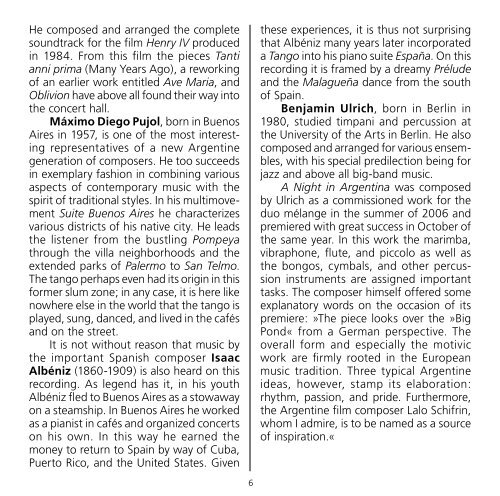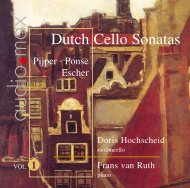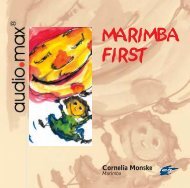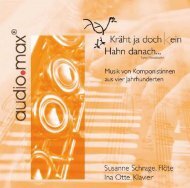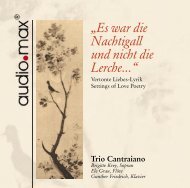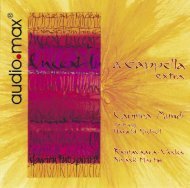BUENOS AIRES - MDG Dabringhaus und Grimm
BUENOS AIRES - MDG Dabringhaus und Grimm
BUENOS AIRES - MDG Dabringhaus und Grimm
Sie wollen auch ein ePaper? Erhöhen Sie die Reichweite Ihrer Titel.
YUMPU macht aus Druck-PDFs automatisch weboptimierte ePaper, die Google liebt.
He composed and arranged the complete<br />
so<strong>und</strong>track for the film Henry IV produced<br />
in 1984. From this film the pieces Tanti<br />
anni prima (Many Years Ago), a reworking<br />
of an earlier work entitled Ave Maria, and<br />
Oblivion have above all fo<strong>und</strong> their way into<br />
the concert hall.<br />
Máximo Diego Pujol, born in Buenos<br />
Aires in 1957, is one of the most interesting<br />
representatives of a new Argentine<br />
generation of composers. He too succeeds<br />
in exemplary fashion in combining various<br />
aspects of contemporary music with the<br />
spirit of traditional styles. In his multimovement<br />
Suite Buenos Aires he characterizes<br />
various districts of his native city. He leads<br />
the listener from the bustling Pompeya<br />
through the villa neighborhoods and the<br />
extended parks of Palermo to San Telmo.<br />
The tango perhaps even had its origin in this<br />
former slum zone; in any case, it is here like<br />
nowhere else in the world that the tango is<br />
played, sung, danced, and lived in the cafés<br />
and on the street.<br />
It is not without reason that music by<br />
the important Spanish composer Isaac<br />
Albéniz (1860-1909) is also heard on this<br />
recording. As legend has it, in his youth<br />
Albéniz fled to Buenos Aires as a stowaway<br />
on a steamship. In Buenos Aires he worked<br />
as a pianist in cafés and organized concerts<br />
on his own. In this way he earned the<br />
money to return to Spain by way of Cuba,<br />
Puerto Rico, and the United States. Given<br />
these experiences, it is thus not surprising<br />
that Albéniz many years later incorporated<br />
a Tango into his piano suite España. On this<br />
recording it is framed by a dreamy Prélude<br />
and the Malagueña dance from the south<br />
of Spain.<br />
Benjamin Ulrich, born in Berlin in<br />
1980, studied timpani and percussion at<br />
the University of the Arts in Berlin. He also<br />
composed and arranged for various ensembles,<br />
with his special predilection being for<br />
jazz and above all big-band music.<br />
A Night in Argentina was composed<br />
by Ulrich as a commissioned work for the<br />
duo mélange in the summer of 006 and<br />
premiered with great success in October of<br />
the same year. In this work the marimba,<br />
vibraphone, flute, and piccolo as well as<br />
the bongos, cymbals, and other percussion<br />
instruments are assigned important<br />
tasks. The composer himself offered some<br />
explanatory words on the occasion of its<br />
premiere: »The piece looks over the »Big<br />
Pond« from a German perspective. The<br />
overall form and especially the motivic<br />
work are firmly rooted in the European<br />
music tradition. Three typical Argentine<br />
ideas, however, stamp its elaboration:<br />
rhythm, passion, and pride. Furthermore,<br />
the Argentine film composer Lalo Schifrin,<br />
whom I admire, is to be named as a source<br />
of inspiration.«<br />
The duo mélange was fo<strong>und</strong>ed by<br />
Almut Unger and Thomas Laukel in 1998.<br />
The two musicians combine the flute with<br />
the marimbaphone and vibraphone, two<br />
melodic percussion instruments, to create<br />
a unique so<strong>und</strong> mix. Some works are also<br />
enriched by the addition of the piccolo or<br />
alto flute as well as by various other instruments<br />
from the inexhaustible resources of<br />
the percussion family of instruments.<br />
The repertoire of the ensemble primarily<br />
consists of works from a wide range of<br />
epochs that have been arranged for this<br />
special ensemble. Whether music from<br />
Mozart’s The Magic Flute, piano compositions<br />
by Maurice Ravel or Robert Schumann,<br />
baroque sonatas, or even polkas and<br />
waltzes by Johann Strauß, the compositions<br />
always develop a special new appeal from<br />
the finely crafted arrangements and the<br />
fine touch of their musical realization, with<br />
the character of the sources never being<br />
lost in this process.<br />
A whole series of contemporary original<br />
works for flute and various percussion<br />
instruments ro<strong>und</strong> off the ensemble’s<br />
programs. From time to time the ensemble<br />
commissions works, and a number of<br />
composers have dedicated works to the<br />
duo in the past.<br />
The duo mélange regularly presents<br />
concerts throughout Germany, has been<br />
a guest in numerous renowned concert<br />
series, and has produced various record-<br />
6 7<br />
ings – since 006 for Musikproduktion<br />
<strong>Dabringhaus</strong> & <strong>Grimm</strong> (<strong>MDG</strong>).<br />
Almut Unger studied flute at the<br />
music colleges in Weimar, Budapest, and<br />
Leipzig. She has played in many orchestras<br />
and ensembles and regularly performs in<br />
chamber ensembles of various kinds. She<br />
also teaches at the Johann Sebastian Bach<br />
Music School in Leipzig and at the Ottmar<br />
Gerster Music School in the Leipziger<br />
Land.<br />
Thomas Laukel studied classical percussion<br />
at the Hanover College of Music<br />
and Theater, University of the Arts in Berlin,<br />
and Orchestra Academy of the Berlin State<br />
Orchestra. His work as a musician ranges<br />
from regular orchestra assignments to<br />
concerts and recordings in the chanson<br />
and jazz fields. In addition, he teaches at<br />
the Ottmar Gerster Music School in the<br />
Leipziger Land as well as at the Delitzsch<br />
Regional Music School. He is responsible for<br />
the arrangements for the duo mélange and<br />
plays a marimbaphone, various percussion<br />
instruments, and a vibraphone made by the<br />
Studio 49 Royal Percussion Company.


